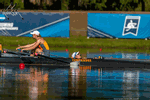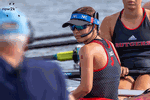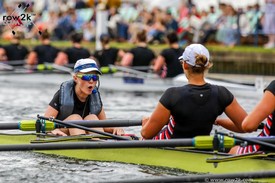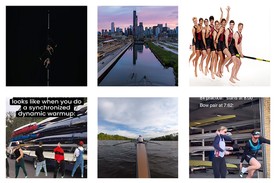In the Driver's Seat, with Francie McKenzie
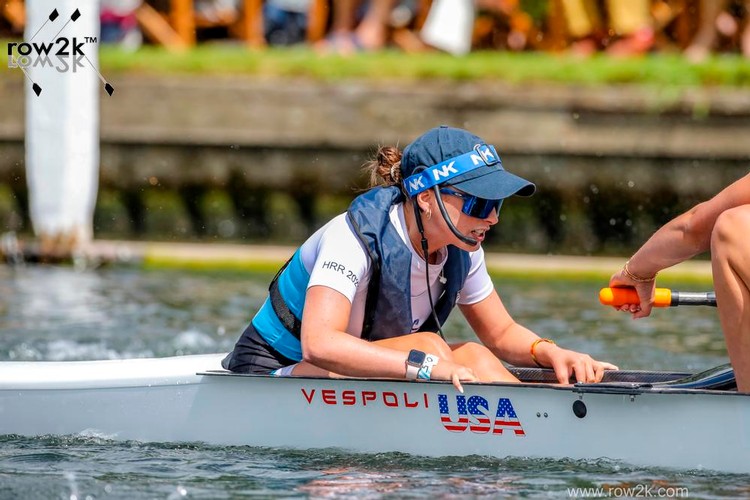
Next up In The Driver's Seat--where we hear from the folks who keep the shells straight and the crews fast--is coxswain Francie McKenzie.
Francie's junior coxing career included a gold medal with the U19 Women's eight in 2022 and wins in the Women's Eight at Youth Nationals and the Head Of The Charles with Greenwich Crew, where she also coxed the first American crew to win the Junior Women's Eight at Henley Royal Regatta.
Since Francie had a pretty good run at Henley, we added special question to her interview about racing between the booms.
Not quite done driving boats, Francie just started her first year with the Princeton Open Women, and had her first race as a Tiger at The Chase this past weekend.
Let's hop In The Driver's Seat with Francie:
row2k - What do you see as the three most important things for being a successful coxswain?
Francie McKenzie - The 3 most important things to being a successful coxswain are confidence, knowing your rowers, and thinking ahead.

Thinking ahead is key to being an effective coxswain. Whether it's being ready for a turn in a head race, knowing what's coming next in your race plan, or analyzing a stressful situation, being one step ahead is extremely important for safety and success. Thinking ahead allows a coxswain to make crucial decisions as situations arise, and keeps the rowers dialed in and ready to take the next moves. By analyzing surroundings and where the crew may be during a race, a coxswain can decide which calls will be best for the crew, and overall have a profound impact on the race result. Utilizing this skill during my coxing career has been a large contributor to my achievements.
Confidence is one of the most important things to being a successful coxswain. As a coxswain, your rowers come to you for guidance. The more confident you are as a coxswain, the more your rowers will trust you. Having confidence in your boat and yourself allows practices to run more smoothly, while also keeping nerves down on race day. I have found that remaining confident and calm on the start line can keep the crew focused and driven.
Knowing your rowers would be my #1 most important factor to being a strong coxswain. Every rower is different. There will be calls some may like, while others don't. Some may take feedback and corrections differently than others. Throughout my career, I have encountered several different types of rowers, all of whom I had to read in order to cox them most effectively. By figuring out what a certain crew likes and doesn't like, I am able to motivate them with what makes them go the fastest, and give feedback/corrections in a successful way. This can be a huge help when it comes to moving seamlessly together, and when aiming for the fastest boat possible.
row2k - What is your favorite drill to run with your crews? Any tips on how to the drill well, for maximum effectiveness?
Francie McKenzie - My favorite drill to run is "square flats".
In this drill, you pause every stroke at arms body over. When I call "square" the crew will square their blades, keeping their blades from touching the water. Then, I'll call "flat" and they will feather their blades again. Then when I call "row" they finish that stroke through the finish and back out to body over. Although it seems pretty simple, matching up the handle heights, timing out of bow, and pressure into the feet is key for keeping the blades off the water and efficiently running the drill. I like to run this drill whenever my boat is having trouble with timing out of bow or when the set is off. It's also a pretty fun way of keeping the rowers engaged and always seems to get them focused on their strokes. Usually after a few rounds of the drill, the crew finds their timing back together and the set is much cleaner.

row2k - What's some of the best coaching advice you've received about your coxing?
Francie McKenzie - The best coaching advice I've received about my coxing would have to be from my coaches at Greenwich Crew, Catherine Starr and Heidi Hunsberger. Something that they would constantly tell our team was "everyday is race day." This has always stuck with me. As a coxswain, it can be very easy to feel disconnected/useless during practices. I think when I was first coxing for the team, I struggled with how to stay motivating on low rating pieces or steady state practices. Even on high intensity workouts, I was sometimes afraid of coxing how I would during races because it was somewhat awkward and I didn't want to overdo it.
After Catherine and Heidi began to use the phrase "everyday is race day," I realized that treating every piece, no matter the intensity or length, as a race, would improve both my personal coxing skills as well as assist in increasing boat speed. Even if at first it felt unfamiliar, once I started to get into every piece as if it were a race, I saw my own skills start to improve. I noticed that I began to know when certain calls were needed, and noticed that the stress and chaos of race day began to disappear. I went into regatta day both prepared and confident with my abilities.
You never truly know the speed other crews have until you see them on the race course. By treating every practice like race day, you can mentally prepare yourself and your rowers for the stressful and emotional situation of a regatta. Additionally, it instills a sense of fear, but also confidence, that can help the crew get faster. Thinking about how other crews are out there working just as hard, and visualizing those crews in a practice, was incredibly helpful in my own coxing journey and in increasing the speed of my team.

row2k - Besides the booms, what is the one thing you would tell other coxswains that it is important to know about racing at Henley? What is your number one tip for racing there?
Francie McKenzie - My one piece of advice about racing at Henley is that the race isn't over until it's over. As cliche as it may sound, it's true. It's important to maintain trust in your crew, even if you might start down.
Throughout the week, I had heard that whoever is ahead at the start of a Henley race tends to win that race. However, this was not the case. In every race, my crew was down at the first 500, but by maintaining trust and executing on the moves, we were able to walk it back every time. In the semi-final against Headington School in the Prince Phillip Challenge Cup, my crew was an entire length off of Headington's boat. Despite our discouraging placement towards the beginning of the race, we kept our composure and confidence. I called for relaxation and trust through the 600 to ensure my boat believed that we could walk it back. I wanted to make sure we stayed clean as a crew...the race was a matter of sitting up and continuing to take the best strokes possible rather than rushing and panicking about being down.
As I called for our moves, we walked back and took the lead from Headington, making it through to the final. Maintaining trust and believing in your crew is a huge contributor to success at Henley. It is a longer course so it is imperative to stay calm and confident because ultimately, the race isn't over until you cross the finish line!

row2k - What is a mid-race call or move that you've made that you'll remember for the rest of your life?
Francie McKenzie - A call that I've made that I'll remember for the rest of my life was during the final of the 2022 U19 World Championships. We had gotten to bowball on the boats next to us and we were continuing to take seats. Nearing the last 10 strokes of the race, I was confident that we were crossing the finish line first. So, knowing my crew and knowing we were about to take gold, I united the girls in the boat for one last time and called "We are USA, and we're world champions."
It was definitely a surreal moment for me; something I had dreamed of and worked towards for weeks was becoming a reality. I could feel Nora Goodwillie's intensity in stroke seat and her excitement that we were doing it. The boat continued to surge forward and I had a rush of happiness that we had accomplished our goals. Just a few strokes later we won, while also setting a new world record for the Women's U19 8+.
Another one of the most fulfilling moments of it all was seeing that we had made our coach, Mike Wallin, so proud. In preparation for the race, Mike brought our boat together for one last meeting. His words of encouragement were very meaningful, especially because we all knew he had so much confidence in us and our speed. I learned so many important lessons from him that I will carry with me throughout my coxing career. Working with him that summer really solidified my confidence in myself and made me a stronger coxswain. His coaching and that moment is something I will never forget.

row2k - Can you tell us anything about how you learned how to make motivating calls?
Francie McKenzie - I learned to make motivating calls from both my coaches at Greenwich, Catherine Starr and Heidi Hunsberger, and from rower feedback. My coaches allowed me to find my own coxing style by putting my own personality and my relationships with my rowers into my coxing. This was something I really valued because it allowed me to create my own voice. We went over recordings pretty often, which was something that definitely made me nervous, but they provided really helpful feedback without judgment. Instead of shutting down calls or tone of voice, they gave me suggestions on what I could do better. This allowed me to maintain some of my own ideas while also making it even better.
As I developed as a coxswain, the main way I learned (and still learn) to make motivating calls was from rower feedback. I love to incorporate new calls into my practices/race plans and see what my rowers respond best to. Talking to my rowers and hearing what they like, dislike, want to hear, or even want in their race plan is something I utilized a lot. This not only helped me improve, but it was also helpful for creating the most effective crews.

row2k - Tell us a bit about your best race/practice?
Francie McKenzie - Although it is difficult to choose, I think my best race would be Head of the Charles 2021 in the Women's Youth 8+. This was my first time racing at Head of The Charles and I had been studying the course for weeks. Unlike any of my past races, having a perfect line was going to be one of the most important factors for my crew's success. We were starting bow number 2 for the 3rd year in a row, and my crew and I were excited to see how fast we could go. During the piece, it was critical to balance both steering and making the right calls. I remember going through each bridge and hearing the echo of the speakers. It was such a cool experience, especially because it was my first time. I distinctly remember coming up on Weeks Bridge, the crucial turn in the race and the one I was most worried about. Despite my fear, I executed just how I had studied and how I had practiced the day before. My crew continued to execute on our moves and coming up on Eliot Bridge, we had walked on the crew in front of us and seemed to gain distance on the one behind. Through the bridge, the sound of each stroke was drowned out by cow bells and incessant cheering. I called our sprint and my crew just emptied everything we had into the last 750. My crew crossed the finish knowing everything we had was put into that last piece.
The weirdest part of the race was not knowing where we had placed once we crossed the line. The suspense once we got on land, and having to wait for each crew to finish to see whether or not our first place would stay was terrifying, but a feeling I will never forget. Once the result was solidified and we had found out we won, we were both relieved and exhilarated. We all hugged and cried, excited that we'd won the Charles for the first time in Greenwich Crew history. To add to the thrill of our victory, the Greenwich Men's 8+ also took home the gold that day. It really added to camaraderie because we all got to share in the success and the joy of making history for Greenwich Crew.

row2k - How about your worst race or practice?
Francie McKenzie - My worst race was the 2021 Women's Youth 8+ semifinal at Northeast Regionals. This was my first Regionals, and my second official race on varsity due to previous Covid restrictions. The weather in Fish Creek Saratoga was, unsurprisingly, terrible. It was raining, windy, and white capping. Staring down the start line, I couldn't even see the white buoy line. I was panicked and felt unprepared. During the piece, the wind was so strong that I was on the rudder for a majority of the piece. Despite my efforts, the wind began to push us into the lane next to us. I feared that this would cause issues with the race officials, even though I had tried my best to fix the problem.
Although it was a stressful race, it was ultimately a huge growing moment for me. When reflecting on the race, I'm proud that I was able to keep my composure and not let the nerves completely take over. I've made sure to not make the same mistake again and have worked on ways to prevent it from happening. I think my boat that year also learned a lot from the race, specifically, how to stay sharp and continue moving even in tough conditions. We went on to win Nationals in the Women's Youth 8+ that year, and I think that powering through that difficult Regionals race with composure really solidified our cohesive and winning mentality as a crew.
Thanks for riding along with Francie, and remember, this column is open to all "drivers" out there, so if you are an experienced coxswain at any level--from juniors to masters--and would be willing to invite row2k to join you in your ride, just contact us here. We'd love to hear from you about what you see from the Driver's Seat.

If you enjoy and rely on row2k, we need your help to be able to keep doing all this. Though row2k sometimes looks like a big, outside-funded operation, it mainly runs on enthusiasm and grit. Help us keep it coming, thank you! Learn more.
Comments | Log in to comment |
There are no Comments yet
| |
- Bont Rowing
- Calm Waters Rowing
- Concept 2
- Craftsbury Sculling
- The Crew Classic
- CrewLAB
- Croker
- Dad Vail Regatta
- Durham Boat Co.
- Empacher
- Faster Masters
- Filippi
- Fluidesign
- h2row.net
- HUDSON
- Live2Row Studios
- Nielsen-Kellerman
- Oak Ridge RA
- Peinert Boat Works
- Pocock Racing Shells
- Race1 USA
- Rockland Rowing Masters Regatta
- RowKraft
- Rubini Jewelers
- Vespoli USA
- WinTech Racing
- Bont Rowing
- Calm Waters Rowing
- Concept 2
- Craftsbury Sculling
- The Crew Classic
- CrewLAB
- Croker
- Dad Vail Regatta
- Durham Boat Co.
- Empacher
- Faster Masters
- Filippi
- Fluidesign
- h2row.net
- HUDSON
- Live2Row Studios
- Nielsen-Kellerman
- Oak Ridge RA
- Peinert Boat Works
- Pocock Racing Shells
- Race1 USA
- Rockland Rowing Masters Regatta
- RowKraft
- Rubini Jewelers
- Vespoli USA
- WinTech Racing



